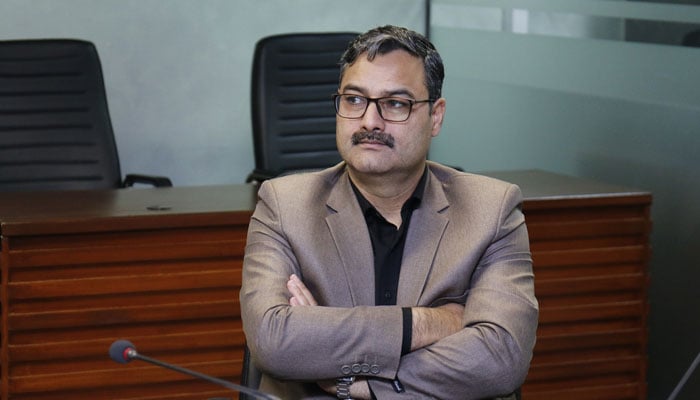Similarities between Pakistan, Uzbekistan discussed
Islamabad: Dr Adam Saud, Dean Faculty of Humanities and Social Science at Bahria University, has said that the slow but steady progress in bilateral relations between Pakistan and Uzbekistan despite geopolitical challenges indicate the similarities in culture, religion and political stances between the two nations.
Dr Saud was giving presentation on historical context during a webinar on “Connectivity between Pakistan and Uzbekistan: history, prospects and challenges” organised by Institute of Regional Studies in collaboration with Tashkent State Transport University here Wednesday.
Dr Saud highlighted the evolution of relations between Pakistan and Uzbekistan, tracing back to the pre-Soviet era. He also underscored the significant growth in trade relations and the recent initiatives to enhance connectivity between the two countries.
Dr Bokhadir Turaev focused on enhancing strategic relations and sustainable development between Uzbekistan and Pakistan. He discussed various initiatives aimed at strengthening cooperation in sectors such as economy, trade, culture, and security. Dr Turaev highlighted the importance of promoting sustainable economic growth, effective water management strategies, educational ties, healthcare reforms and economic self-sufficiency through localised production.
Dr Melike Basbinar from Tashkent State Transport University and Director, Uzbekistan-Turkey Cooperation Center, provided insights into the historical connections between Pakistan and Uzbekistan emphasising the shared heritage and the significance of the Silk Road in fostering economic and cultural exchange. She discussed collaborative areas in modern life, including diplomatic ties, economic initiatives, educational partnerships, and cultural exchanges. Dr Basbinar also addressed common challenges and proposed strategic approaches to overcome them.
Khalid Usman Qaiser, Pakistan’s former Ambassador to Tajikistan, discussed the current state of bilateral relations between Pakistan and Uzbekistan, acknowledging challenges such as banking issues, air connectivity and visa-related concerns. He highlighted the importance of consistent engagement, resolving existing concerns and maximising the available opportunities for cooperation. Mr Khalid emphasised the need for close coordination, intelligence sharing and understanding of mutual limitations.
The panel discussion concluded with highlighting the deep-rooted religious, cultural and political ties between Pakistan and Uzbekistan as well as the growing trade and connectivity initiatives. They stressed the importance of further people-to-people connections and academia-to-academia collaborations in strengthening bilateral relations.
-
 King Charles Makes It ‘absolutely Clear’ He Wants To Solve Royal Crisis
King Charles Makes It ‘absolutely Clear’ He Wants To Solve Royal Crisis -
 Royal Family Warned To ‘have Answers’ Amid Weak Standing
Royal Family Warned To ‘have Answers’ Amid Weak Standing -
 Marc Anthony On Why Bad Bunny’s Super Bowl Show Mattered
Marc Anthony On Why Bad Bunny’s Super Bowl Show Mattered -
 Kid Rock Gets Honest About Bad Bunny’s Performance At Super Bowl
Kid Rock Gets Honest About Bad Bunny’s Performance At Super Bowl -
 Kylie Jenner Reveals Real Story Behind Her 'The Moment' Casting
Kylie Jenner Reveals Real Story Behind Her 'The Moment' Casting -
 Eva Mendes Reveals One Costar She Envied Ryan Gosling Over
Eva Mendes Reveals One Costar She Envied Ryan Gosling Over -
 Halsey Marks Fiancé Avan Jogia's Birthday With Emotional Note
Halsey Marks Fiancé Avan Jogia's Birthday With Emotional Note -
 China: Stunning Drone Show Lights Up Night Sky Ahead Of Spring Festival 2026
China: Stunning Drone Show Lights Up Night Sky Ahead Of Spring Festival 2026 -
 Andrew's Epstein Scandal: Will King Charles Abdicate Following King Edward's Footsteps?
Andrew's Epstein Scandal: Will King Charles Abdicate Following King Edward's Footsteps? -
 Billy Joel Leaves Loved Ones Worried With His 'dangerous' Comeback
Billy Joel Leaves Loved Ones Worried With His 'dangerous' Comeback -
 Prince William Dodges Humiliating Question In Saudi Arabia
Prince William Dodges Humiliating Question In Saudi Arabia -
 Dax Shepard Describes 'peaceful' Feeling During Near-fatal Crash
Dax Shepard Describes 'peaceful' Feeling During Near-fatal Crash -
 Steve Martin Says THIS Film Has His Most Funny Scene
Steve Martin Says THIS Film Has His Most Funny Scene -
 Kensington Palace Shares Update As Prince William Continues Saudi Arabia Visit
Kensington Palace Shares Update As Prince William Continues Saudi Arabia Visit -
 Fugitive Crypto Scammer Jailed For 20 Years In $73m Global Fraud
Fugitive Crypto Scammer Jailed For 20 Years In $73m Global Fraud -
 Will Andrew Mountbatten-Windsor Finally Go To Jail Now That King Charles Has Spoken Out? Expert Answers
Will Andrew Mountbatten-Windsor Finally Go To Jail Now That King Charles Has Spoken Out? Expert Answers




